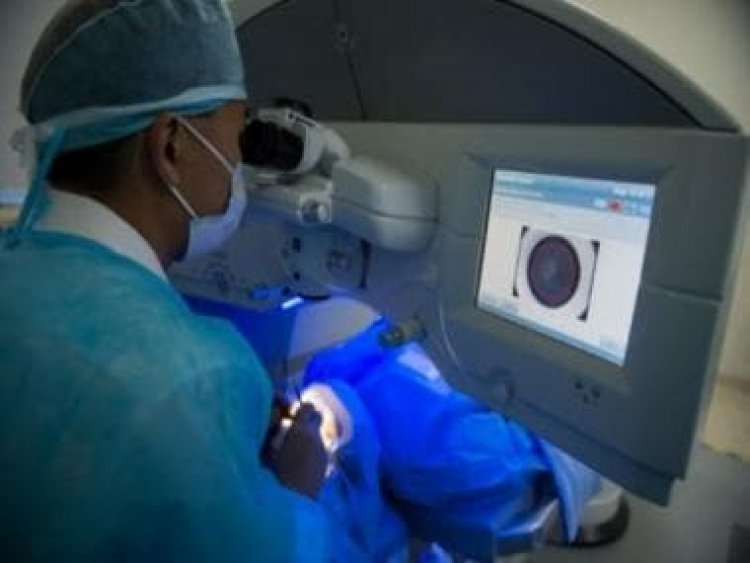LASIK, the laser eye surgery to correct vision errors, is not as safe as you think. Here’s why
LASIK, the laser eye surgery to correct vision errors, is not as safe as you think. Here’s why

You’d think LASIK eye surgery, one of the most commonly performed laser refractive surgery to correct vision problems, is all too safe. But now the procedure has come under the lens of the United States Food and Drug Administration (FDA). Do we have reasons to worry?
The surgery was given a green signal by the US FDA more than two decades ago as a safe alternative to glasses and contact lenses. However, a new guidance draft, which is still being reviewed by the FDA, may change the way we look at LASIK.
The federal agency recently released a 25-page draft recommending new guidance, which talks about LASIK’s risks and potential complications, for people who are considering the surgery.
The development comes as the FDA received various inputs from patients who felt they were not completely aware of the complications associated with the surgery.
If you are considering having a LASIK surgery, here is everything you need to know about it and the recent FDA warning.
Also read: Why human beings procrastinate and why it can sometimes be useful
Why do people opt for LASIK surgery?
The cornea helps focus light to create an image on the retina. The FDA explains that it is similar to the lens of a camera that focuses light to create an image on film. The bending and focusing of light in other words is known as refraction.
Notably, the eye and the shape of the cornea can be imperfect, thus resulting in the image on the retina being out-of-focus, i.e. blurred or distorted. These errors in the focusing power of the eye are termed refractive errors.
The primary types of refractive errors include myopia, hyperopia, and astigmatism.
According to the agency, people with myopia, also known as nearsightedness, have difficulty seeing distant objects as clearly as near objects. While people with hyperopia or farsightedness, face difficulty in seeing near objects as clearly as distant objects. On the other hand, astigmatism is a distortion of the image on the retina caused by irregularities in the cornea or lens of the eye.
These vision errors are commonly observed in teenagers and millennials due to their longer screen times and unhealthy diets. According to the World Health Organisation data released last year, over 2.2. billion people globally suffered from myopia or distance vision impairment.
People opted for glasses or contact lenses to fix their eye imperfections. Then LASIK surgery came into the picture.
What is LASIK?
People opt for surgical procedures such as refractive surgery to improve their vision.
LASIK, which stands for Laser-Assisted In Situ Keratomileusis, is one of them. It is a surgical procedure intended to reduce a person’s dependency on glasses or contact lenses, according to the FDA.
The procedure permanently reshapes the cornea and removes corneal tissue in a precise and controlled manner using an excimer laser. The surgery takes less than 30 minutes to perform.

More than half a million people get LASIK surgery done each year, at a cost of anywhere from $1,000 to $4,000 per eye, reported Forbes.
According to a report by Global Market Insights Inc, the LASIK eye surgery industry size was valued at over USD 1.6 billion last year and is expected to cross USD 2 billion in valuation by 2030. In many cases, since the procedure is considered to be cosmetic, it is not covered by health insurance.
Since 1997, more than 40 million people worldwide have had LASIK procedures. While in India alone, there are more than 400 laser centres, performing more than half a million procedures every year, according to New Vision India, which offers the surgery in India.
The cost of LASIK surgery in India can cost anywhere from Rs 20,000 to Rs 1.5 lakh, depending on various factors.
Also read: Are you a picky eater? Blame your DNA
What does the FDA warn about?
The FDA shared warnings, including information on the risks of double vision, dry eyes, ongoing pain, seeing halos around objects, a need for glasses, and other issues caused by the surgery.
The US-based agency’s new guidelines say that patients considering the LASIK procedure should be given a “decision checklist” to review before surgery. They should also receive a list mentioning the potential side effects, the agency said.
The FDA said, “It is important for people considering LASIK to have clear and understandable information on the benefits and risks of the surgery to help inform their decision on whether to get LASIK.”
For each characteristic or condition, the agency has warned that details of the patient should go ahead or not with the surgery should be considered. For instance, if a patient has “severe dry eyes”, they are given a warning that LASIK should not be considered, while if they have moderate or mild dry eyes, they should be warned to consider not having LASIK.
Additionally, for those with characteristics such as “cornea not thick enough”, eye inflammation, active autoimmune or connective tissue disease, uncontrolled glaucoma, and uncontrolled diabetes, LASIK might be unsafe.
“These recommendations, when finalised, are intended to help ensure physicians can share and patients can understand information about the benefits and risks of LASIK devices,” it added in the draft guidance.
The FDA added that they have learned a lot about the risks, “but also enormous benefits of laser vision correction as compared to contact lens overwear and contact lens-related infections. Further, this information is intended to enhance, but not replace, the physician-patient discussion of the benefits and risks of LASIK devices that may uniquely pertain to individual patients.”
With inputs from agencies
Read all the Latest News, Trending News, Cricket News, Bollywood News,
India News and Entertainment News here. Follow us on Facebook, Twitter and Instagram.
What's Your Reaction?

























































